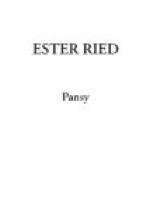“Ester, there is one thought in connection with this subject that troubles me very much. Do you really think, as you have intimated, that I am selfish, that I consult my own tastes and desires too much, and so do injury to the cause. For instance, do you think I prejudiced my father?”
What a sweet, humble, even tearful, face it was! And what a question to ask of Ester! What had developed this disagreeable state of mind save the confused upbraidings of her hitherto quiet conscience over the contrast between Cousin Abbie’s life and hers.
Here, in the very face of her theories to the contrary, in very defiance to her belief in the folly, and fashion, and worldliness that prevailed in the city, in the very heart of this great city, set down in the midst of wealth and temptation, had she found this young lady, daughter of one of the merchant princes, the almost bride of one of the brightest stars in the New York galaxy on the eve of a brilliant departure for foreign shores, with a whirl of preparation and excitement about her enough to dizzy the brain of a dozen ordinary mortals, yet moving sweetly, brightly, quietly, through it all, and manifestly finding her highest source of enjoyment in the presence of, and daily communion with, her Savior.
All Ester’s speculations concerning her had come to naught. She had planned the wardrobe of the bride, over and over again, for days before she saw her; and while she had prepared proper little lectures for her, on the folly and sinfulness of fashionable attire, had yet delighted in the prospect of the beauty and elegance around her. How had her prospects been blighted! Beauty there certainly was in everything, but it was the beauty of simplicity, not at all such a display of silks and velvets and jewels as Ester had planned. It certainly could not be wealth which made Abbie’s life such a happy one, for she regulated her expenses with a care and forethought such as Ester had never even dreamed of. It could not be a life of ease, a freedom from annoyance, which kept her bright and sparkling, for it had only taken a week’s sojourn in her Aunt Helen’s home to discover to Ester the fact that all wealthy people were not necessarily amiable and delightful. Abbie was evidently rasped and thwarted in a hundred little ways, having a hundred little trials which she had never been called upon to endure. In short, Ester had discovered that the mere fact of living in a great city was not in itself calculated to make the Christian race more easy or more pleasant. She had begun to suspect that it might not even be quite so easy as it was in a quiet country home; and so one by one all her explanations of Abbie’s peculiar character had become bubbles, and had vanished as bubbles do. What, then, sustained and guided her cousin? Clearly Ester was shut up to this one conclusion—it was an ever-abiding, all-pervading Christian faith and trust. But then had not she this same faith? And yet could any contrast be greater than was Abbie’s life contrasted with hers?




